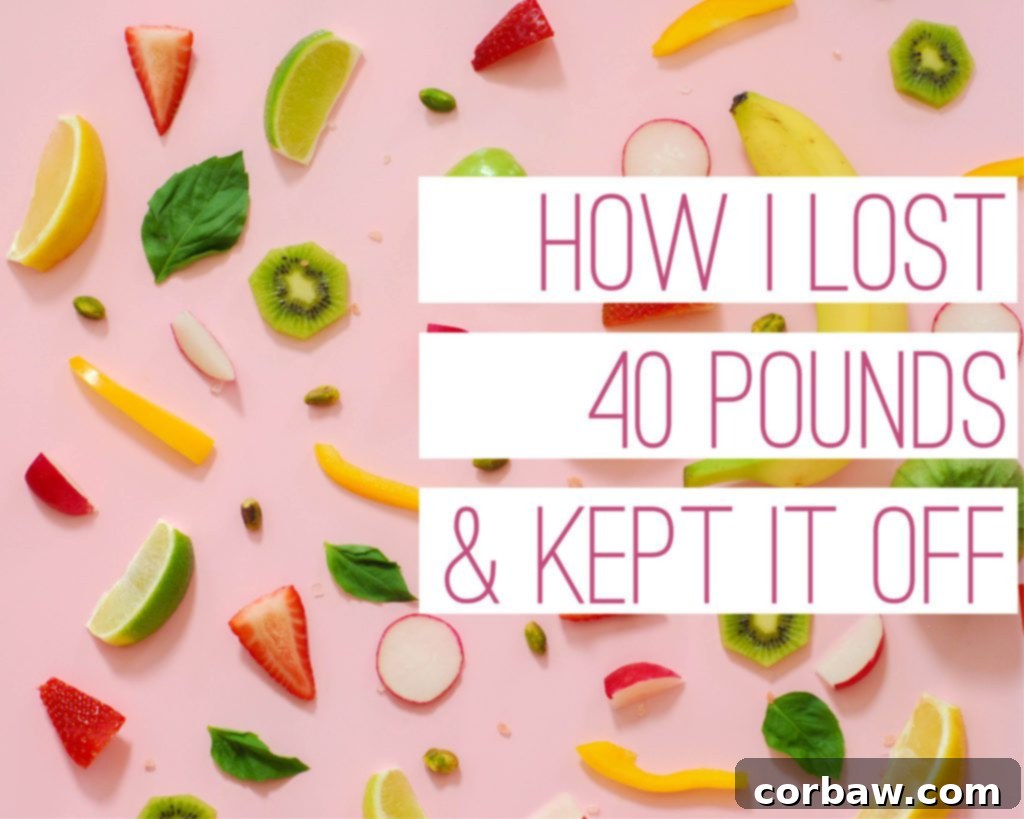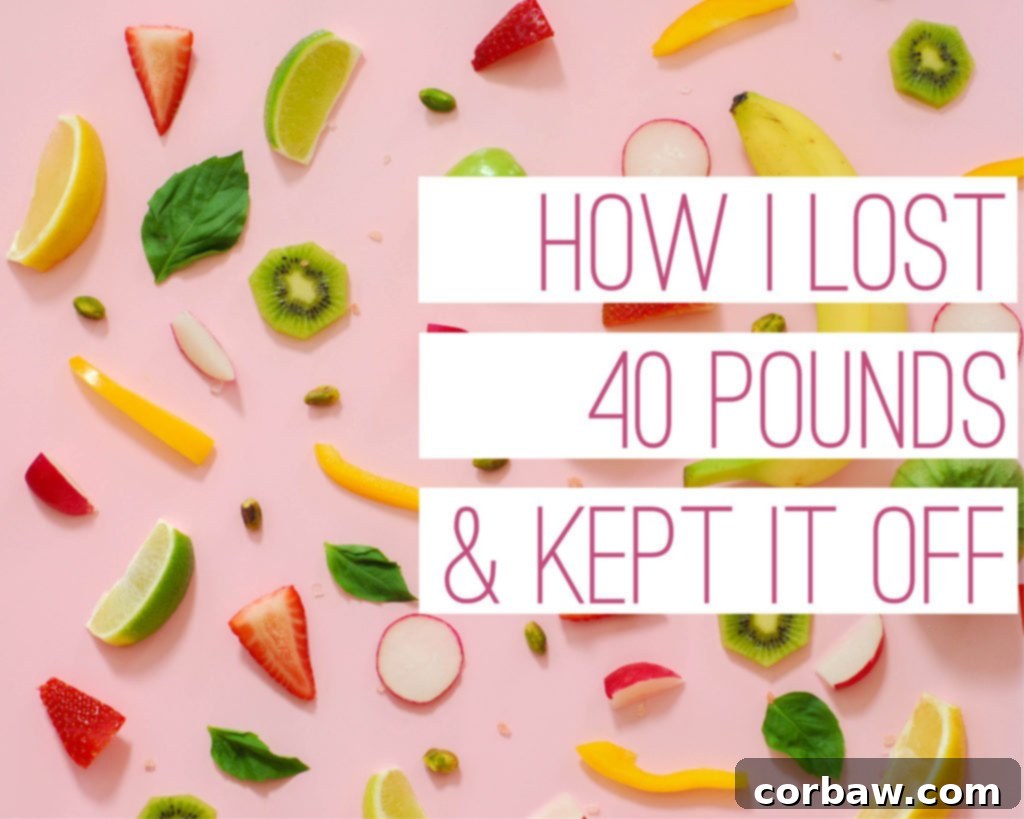Sustainable Weight Loss: My Journey to Losing 40 Pounds and Keeping It Off for Good

Embarking on a personal weight loss journey is rarely a straightforward path; it’s often a winding road filled with trials, triumphs, and invaluable lessons. Over a span of two and a half years, I successfully shed approximately 40 pounds. More importantly, I’ve managed to keep that weight off for nearly two years now, experiencing only minor fluctuations – because perfection is an illusion, especially when it comes to long-term health and fitness. While 40 pounds might not seem like an astronomical figure to everyone, for me, it represented a significant transformation and a monumental personal achievement. It was challenging, demanding consistent effort and a complete shift in mindset. When I share this accomplishment with others, the reactions I receive are incredibly varied, reflecting different perspectives on health and weight management:
- “That’s awesome! Good for you.” (Typically from individuals who haven’t grappled with losing more than a few pounds.)
- “But that’s… such a long time?” (A common response from those contemplating their own weight loss endeavors, often seeking quick fixes.)
- “But how?!?!” (This usually comes from people who are actively in the midst of their own weight loss struggles, looking for concrete strategies and insights.)
Regardless of the reaction, I’ve realized that my “journey” – a word I admit to disliking due to its often overused and cliché connotations – offers genuine insights into what it takes to achieve a healthier relationship with food, exercise, and ultimately, a more comfortable and confident sense of self. This isn’t about rapid results, but rather about building sustainable habits for a lifetime of wellness.

The Early Struggle: Indulgence, Picky Eating, and the Yo-Yo Dieting Cycle
My foundational relationship with food began shaping significantly during my college years. It was then that I started teaching myself how to cook, a passion that eventually led to the creation of this very blog. I completely fell in love with the culinary arts, finding immense joy and a much-needed escape from the pressures of school and work in my kitchen experiments. However, a large portion of my early cooking adventures revolved around rich, indulgent, and often not-so-healthy recipes. This, combined with my childhood history as a relatively picky eater, set the stage for predictable weight gain. I was a prime candidate for the “freshman fifteen,” and then some.
I distinctly remember a phase in my childhood where I adamantly refused to eat chicken. One evening at dinner, in a desperate attempt to avoid it, I subtly threw pieces of chicken under the table, hoping my parents wouldn’t notice. This ingenious plan, as most child schemes do, lasted only until they rose from their seats, revealing the incriminating evidence. I was, predictably, made to retrieve and eat every single piece – off the floor. Thanks, Mom and Dad, for that unforgettable lesson in not wasting food! This early selective eating meant I hadn’t developed a broad palate for nutritious foods, making healthy eating choices a greater challenge later in life.
These two factors – a developing penchant for indulgent cooking and a history of selective eating – created the perfect storm for weight gain during my college years. As expected, I gained weight. This wasn’t just a physical change; it initiated years of frustrating yo-yo dieting, where I’d lose a few pounds only to gain them back, often more. This cycle left me feeling incredibly disheartened and with a poor body image, a narrative I’m sure many can relate to. The emotional toll of constantly battling my weight and feeling unsuccessful was immense, impacting my self-esteem and overall well-being.
To compound the challenges, shortly after graduating college, I moved back to Portland and took on a demanding job: managing a PASTA restaurant, working 50 hours a week. The irony was not lost on me. As a manager, I had the privilege of eating as much as I wanted, for free. People would often suggest, “Well, they have salads on the menu, too, don’t they?” While true, imagine being three hours hungry, having just navigated a chaotic dinner rush, constantly on your feet, and then faced with the choice between a light salad and a warm, comforting, generously portioned plate of pasta. The choice was almost always the latter, and so the pattern of unhealthy eating and weight gain continued its relentless march. This environment made it nearly impossible to cultivate healthier habits, reinforcing my existing struggles.
A New Beginning: South Africa and the Dawn of Fitness (2014)
Then, in 2014, a pivotal decision was made: we decided to move to South Africa. My husband was pursuing his master’s degree, and I had the incredible opportunity to dedicate my time to working on my blog full-time. It was an extraordinary year, not just for personal growth and adventure, but also because it proved to be the crucial catalyst that jump-started my weight loss journey. The change of scenery, combined with a more flexible schedule, provided the fresh start I desperately needed.
Our eating habits weren’t immediately perfect – we had our fair share of “meaty fusilli” (as we affectionately dubbed it, probably a thousand times), but we certainly made more conscious and healthier food choices overall. The true game-changer, however, was joining a gym located directly across the street from our residence. For the first time, I committed to working out at least four times a week. This was a monumental shift for me. I had never considered myself particularly athletic or in good physical shape. The immediate and profound confidence boost that came with consistent exercise was absolutely transformative. Before this, I harbored fears about so many activities because I doubted my physical capabilities. Hiking seemed impossible. Exploring a new city? My mind would immediately fill with worries: “What if I get too tired? Too hot? Too hungry? Too thirsty?” Exercise began to dismantle these self-imposed limitations, one workout at a time, proving to me that I was stronger and more capable than I ever imagined.

Our hike to Elephant’s Eye Cave near Cape Town
Breaking Barriers: Embracing Physical Activity
My typical gym routine involved 30-45 minutes of cardio, followed by some basic weight lifting. This phase was quite amusing, largely because I was self-teaching, and the gym staff seemed, to put it mildly, spectacularly uninformed. I’d navigate through various machines, none of which had labeled plates, leaving me completely clueless about the amount of weight I was actually lifting. On one occasion, out of sheer curiosity, I inquired about the weight of each plate. To my astonishment, absolutely no one knew the answer. (cue significant face palm emoji). Despite the comedic aspects of this learning curve, the crucial takeaway from that year was profound: I discovered that athleticism wasn’t an exclusive club for “other people.” My body was capable of pushing limits, and nothing truly scary or disastrous would happen in the process. This realization was incredibly liberating, shifting my entire perspective on physical activity and my own potential. It was the first time I truly enjoyed moving my body, not as a punishment, but as a celebration of what it could do.
By the end of 2014, I proudly celebrated losing a significant 20 pounds.
Building Momentum: Partner Support and Consistent Habits (2015-2016)
Upon our return from South Africa, we made sure to maintain the positive momentum by joining a new gym. This move proved even more beneficial because my husband, who hadn’t been a member of my South African gym, brought a wealth of knowledge about weight lifting. Thanks to his former gymnast father and a mini-gym setup in their garage during his upbringing, he had a solid foundation. He graciously shared his expertise, teaching me proper form and technique, and with a spotter, I was able to push myself further and safely increase my strength. However, despite the consistent workouts, my eating habits weren’t yet fully aligned with my fitness goals. I had resumed my role as a manager at the pasta restaurant, which meant long, unpredictable hours and easy access to tempting, calorie-dense foods. This sporadic schedule and environment were hardly a recipe for sustained dietary success. That year, we were also planning our wedding, and I had hoped to shed another 10 pounds. I only managed to lose about 2, but honestly, I was simply relieved not to have gained back what I had worked so hard to lose. It highlighted the challenges of maintaining progress amidst old habits and tempting environments.
So, another 2 pounds were successfully shed in 2015, a small but important victory against potential backsliding.
The year 2016 marked a significant turning point in my weight loss journey. I started a new job that offered a much more consistent schedule, a factor that cannot be underestimated in building healthy routines. Concurrently, my husband launched his own serious commitment to weight loss at the start of that year. Here’s a truth bomb: losing weight becomes infinitely easier and more enjoyable when your partner is fully on board and supportive. It’s even better when their commitment matches, or, as quickly became our case, surpasses your own. This shared dedication created an incredibly supportive environment for both of us, fostering healthy competition and mutual encouragement.
The Power of a System: Meal Planning and Strategic Cheat Nights
Together, we were working out consistently, eating well, and implementing all the right strategies. This was the year we truly discovered and refined our system for sustainable weight management. A cornerstone of our approach was proactive meal planning. Each week, I would meticulously plan out our dinners, ensuring variety, nutrition, and portion control. This eliminated guesswork and impulse decisions, leading to consistently healthier choices. Crucially, we also scheduled a designated “cheat night,” almost without fail reserved for our beloved pizza. The genius of this system was psychological: knowing that a planned indulgence was just around the corner made it immeasurably easier to stick to our healthier eating habits throughout the rest of the week. This balanced approach prevented feelings of deprivation and made adherence far more sustainable, transforming what could be a restrictive diet into a manageable lifestyle. I delve much deeper into the specifics of this comprehensive meal planning strategy, including how to create balanced meals and integrate treats responsibly, in this detailed post, which includes valuable tips and my personal planning template.
Thanks to this structured approach, an additional 18 pounds came off in 2016, bringing my total weight loss to 40 pounds.
Reaching this milestone was exhilarating; I was finally back down to the same weight I had maintained in my senior year of high school! There are few feelings more rewarding than this accomplishment. Seriously, for weeks after hitting such a personal goal, you feel like you’re floating on air, imbued with an incredible sense of lightness and pride. It wasn’t just about the number; it was about reclaiming a version of myself I thought was lost.
Sustaining Success: Long-Term Maintenance and Evolving Habits
Initially, I had ambitious plans to continue losing more weight, get even stronger, and achieve every fitness goal imaginable. Life, as it often does, had other plans. While I haven’t pursued further drastic weight loss, I’ve successfully maintained my weight, generally floating within a comfortable range, perhaps a couple of pounds up or down. The focus has decisively shifted from aggressive loss to sustainable maintenance and overall well-being. I’ve managed to keep a fairly consistent workout schedule, though I always aspire to improve and incorporate more variety. Experimentation has been key in finding enjoyable forms of cardio: I’ve tried running, walking, step aerobics, and spinning. My verdict? I’ve surprisingly found myself enjoying running during the summer months, though I’m mindful of potential knee impact and always prioritize proper form and recovery. My husband, on the other hand, absolutely loves walking, consistently clocking around 14,000 steps every day. I enjoy it too, wishing I had more dedicated time for it, perhaps integrating it more into my daily routine. Spinning, for me, just doesn’t quite click with my body or my motivation. Step aerobics is a blast, but I’m eagerly awaiting new video content to keep things fresh and engaging. Finding an exercise you genuinely look forward to is crucial for long-term adherence.
One habit I have absolutely not abandoned is menu planning. Without a doubt, this has been the single best thing I’ve ever implemented for our household’s health and sanity. It removes the daily mental load of “what’s for dinner?” and ensures a healthy, home-cooked meal is consistently on the table each night. It’s a proactive approach that eliminates decision fatigue and promotes balanced nutrition, preventing last-minute unhealthy choices. For a deeper dive into my proven meal planning strategies, including grocery lists and prep tips, be sure to explore the dedicated post I’ve written on the topic. It’s packed with actionable advice and resources designed to simplify your week.
Eager to kickstart your own planning? Get a taste of my effective method and grab your very own meal planning template today. Download it here! This resource can be a game-changer for your weekly routine.
Our scheduled cheat night remains a cherished tradition. I absolutely ❤ cheat night – it’s a vital component of a balanced, long-term approach to healthy eating, allowing for enjoyment without guilt or feeling deprived. It’s a psychological safety valve that makes the healthier choices throughout the week feel less restrictive.
Another subtle but significant change has been my relationship with alcohol. While I’m certainly not anti-booze, I’ve noticed a distinct improvement in how I feel – physically and mentally – when I limit my alcohol consumption to 2-3 nights a week. This mindful approach to drinking has contributed positively to my overall energy levels and sleep quality. My husband, however, continues to enjoy his nightly beer, highlighting that personal choices and preferences play a large role in what works for each individual’s sustainable lifestyle.
Beyond the Scale: The Transformative Power of a Healthy Lifestyle
Reflecting on this entire journey, the most profound changes extend far beyond the numbers on a scale. Overall, I now feel genuinely good about myself and comfortable in my own skin. I’ve developed a deep understanding of how different foods impact my body and mood; I know precisely what makes me feel energetic and vibrant, and what leaves me sluggish and unwell (sugar, for instance, and I have a complicated, often regrettable, relationship, so I choose to limit it significantly). This self-awareness is invaluable for making consistent choices that support my well-being, rather than just chasing a number.
Physically, I can confidently embark on a hike, knowing I’ll be perfectly fine, even if it’s still not my absolute favorite activity. This capability represents a huge mental shift from my past self, who would have avoided such challenges. In fact, my comfort level in the outdoors has significantly increased across the board, a change I directly attribute to my weight loss and consistent exercise routine. The most surprising transformation? We camp now. If you had told me five years ago that I would eventually be regularly enjoying camping trips, enduring nights in a tent and embracing the wilderness, I would have vehemently denied it – probably with a dramatic eye-roll and a tear or two. It’s a testament to how much my capabilities and willingness to embrace new experiences have evolved, demonstrating the profound impact of physical health on overall life enjoyment and confidence.
My Key Takeaways for Sustainable Weight Loss and Lifelong Wellness
Looking back, several critical lessons emerged from this multi-year process that are applicable to anyone pursuing a healthier lifestyle:
- Patience is Paramount: Sustainable weight loss is not a sprint; it’s a marathon. Embracing a slow and steady approach helps ingrain habits that last, avoiding the pitfalls of crash diets.
- Consistency Over Perfection: Small, consistent efforts compound over time. Don’t let a single “bad” meal or missed workout derail your entire plan. Progress, not perfection, is the goal.
- Find Your Movement: Don’t force yourself into exercises you hate. Experiment until you find physical activities you genuinely enjoy, making fitness a source of joy, not a chore. This is key for long-term adherence.
- The Power of Support: Having a partner or a strong support system makes a significant difference, offering encouragement, accountability, and shared motivation.
- Strategic Planning is Key: Meal planning and incorporating occasional, planned indulgences prevent feelings of deprivation and promote long-term adherence to a healthy eating pattern. Plan your meals, plan your treats.
- Listen to Your Body: Pay attention to how different foods and activities make you feel. This self-awareness is crucial for optimizing your well-being and making choices that genuinely nourish you.
- It’s More Than Just Weight: The mental, emotional, and confidence boosts gained from a healthier lifestyle are often far more rewarding and impactful than the number on the scale. Focus on overall well-being.
- Embrace New Experiences: As you gain confidence and physical capability, don’t shy away from activities you once deemed impossible. Life opens up in unexpected ways.
All in all: it was undeniably a slow process, filled with continuous learning and adaptation, but I am incredibly happy and proud of where I’ve landed – both physically and mentally. This journey has been one of self-discovery and empowerment, proving that lasting change is absolutely achievable with dedication, the right strategies, and a compassionate approach to yourself. It’s about building a life where health feels natural and sustainable, not a constant battle.

